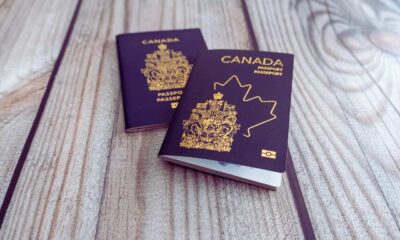Work in Canada
Discover Who Can Work in Canada Without a Work Permit

Welcome to the ultimate guide on exploring work opportunities in Canada without the hassle of obtaining a work permit. Canada, known for its diverse and promising work landscape, attracts individuals from around the world seeking career advancement and personal growth. While securing a Canadian work permit is typically a prerequisite for employment, exceptions exist that allow foreign nationals to work in Canada hassle-free.
In this comprehensive guide, we’ll delve into the various categories of individuals who can explore work opportunities in Canada without the constraints of a work permit.
1. Business Ventures Sans Work Permits
Are you involved in cross-border business or trade activities? If so, you may qualify as a business visitor to Canada. Business visitors enjoy streamlined access to the Canadian market, enabling them to conduct international business within the country’s borders without the need for a work permit.
However, certain criteria must be met to qualify:
| Criteria | Description |
| Intent | Demonstrated lack of intent to engage in gainful employment within Canada. |
| Scope of Activity | Engaging in international business activities that are cross-border in nature. |
Documentation Made Easy
Entering Canada as a business visitor requires the presentation of specific documentation to immigration officials. Support letters from employing organizations or invitations from Canadian counterparts can significantly enhance your case as a bona fide business visitor, ensuring smooth entry into the country.
2. Foreign Representatives
Foreign representatives, along with their personal staff and family members, can work in Canada without a work permit upon obtaining accreditation from the Department of Foreign Affairs and International Trade (DFAIT). This exemption also extends to diplomatic representatives assigned to United Nations offices in Canada, simplifying diplomatic engagements without bureaucratic hurdles.
Family members of foreign representatives can also work in Canada without a work permit by obtaining a ‘no objection letter’ from the Protocol Department of DFAIT. This streamlined process enables family members to accompany foreign representatives on their diplomatic missions, fostering cohesion and support within diplomatic circles.
3. Military Personnel – Serving Nationally and Internationally
Military or civilian personnel stationed in Canada under the Visiting Forces Act are exempt from work permit requirements, allowing them to fulfill their duties without bureaucratic impediments. Additionally, family members of these individuals are also eligible to work and study in Canada, promoting stability and integration within military communities.
Maximize Your IELTS Score:
Start your English journey: Learn English with British Council teachers — Up to 10% off
English Online Self-Study course: Learn English at your own pace with bite-sized exercises — Up to 10% off
Prepare for IELTS with the experts: Get the score you need with the co-creator of the IELTS test- Up to 15% off
Documentation Requirements
While military personnel benefit from exemptions related to work permits, adherence to documentation requirements remains crucial. Individuals and their families should ensure compliance with passport regulations, temporary resident visas, and other necessary documentation to facilitate seamless integration into Canadian society.
4. Foreign Government Officers in Exchange Programs
Canada engages in agreements with other nations to facilitate the international exchange of government employees, fostering collaboration and knowledge sharing across borders. Foreign government officers participating in such programs can work within federal or provincial government departments without the need for work permits, promoting diplomatic ties and cooperation.
Executive-level officers engaged in government exchange programs may require contractual agreements from Canada’s Public Service Commission (PSC) to formalize their roles. However, officers operating below executive capacities can commence their duties without formal contracts, provided they adhere to prescribed guidelines and regulations.
5. American Cross-Border Maritime Law Enforcement Officers
Certain law enforcement vessels operating across the US/Canada border employ joint Canadian and American crews to uphold maritime security. American crew members operating within Canadian territory can fulfill their duties without additional work authorization, contributing to seamless border surveillance and enforcement efforts.
Visa Requirements
While American cross-border maritime law enforcement officers enjoy exemptions from work permit requirements, adherence to visa regulations remains essential. Individuals hailing from countries mandating a Temporary Resident Visa (TRV) for entry into Canada must secure appropriate visas to fulfill their duties within Canadian airspace, ensuring compliance with immigration protocols.
6. On-Campus Employment
Students holding valid study permits in Canada have the opportunity to work on-campus throughout their studies, provided they meet eligibility criteria. This exemption enables students to gain valuable work experience while pursuing their academic endeavors, fostering holistic development and integration within educational institutions.
Eligibility for Off-Campus Roles
Students serving as research or teaching assistants off-campus must meet specific criteria to qualify for on-campus employment exemptions. Recommendations from academic departments, direct supervision by faculty members, and affiliation with research institutes are among the prerequisites for off-campus employment eligibility, ensuring alignment with academic objectives.
7. Athletes and Team Members
Professional and amateur athletes, along with essential team members, have the opportunity to participate in individual or team-based sports activities in Canada. Whether attending professional team tryouts or participating in international competitions, understanding exemption criteria is essential for athletes seeking to explore opportunities within Canadian sports arenas.
Entry for Sporting Enthusiasts
Spouses of professional athletes can also benefit from LMIA-exempt work permits, allowing them to accompany their partners on sporting engagements in Canada. This provision fosters inclusivity and support within the sporting community, enhancing the overall experience for athletes and their families.
8. News Reporters and Media Crews
News reporters and media crews enjoy exemptions from work permit requirements when reporting on events in Canada, provided their employing company is not Canadian. This exemption underscores the importance of journalistic freedom and facilitates seamless reporting on diverse events unfolding within Canada’s borders.
Work Authorization for Media Crews
While news reporters and journalists benefit from exemptions, media crews engaged in producing travelogues, documentaries, and similar content must adhere to work permit regulations. Understanding visa requirements and seeking appropriate authorization is essential for media crews seeking to capture captivating stories within Canada’s diverse landscape.
9. Public Speakers
Presenters at events, including guest speakers and seminar leaders, can inspire audiences in Canada without requiring work permits. Whether delivering keynote addresses or leading workshops, public speakers play a vital role in knowledge dissemination and audience engagement, fostering dialogue and collaboration within professional circles.
Commercial Engagements
Commercial speakers hired by Canadian entities may require LMIA and work permits for their engagements, depending on the nature of their presentations. Understanding regulatory requirements and seeking appropriate authorization is essential for commercial speakers seeking to share their expertise within Canadian markets.
10. Convention Organizers
Convention organizers play a pivotal role in coordinating corporate meetings, trade shows, and exhibitions in Canada, contributing to knowledge dissemination and networking opportunities. While organizers hired for Canadian events require work permits, exemptions exist for individuals attending conferences and meetings as business visitors, fostering collaboration and innovation within diverse industries.
Adhering to Work Permit Regulations
Convention organizers working on Canadian events must obtain work permits to fulfill their roles, ensuring compliance with immigration protocols and labor regulations. Understanding the distinction between convention organizers and attendees is crucial for facilitating seamless event coordination and fostering meaningful interactions among participants.
11. Clergy
Clergy members involved in preaching, overseeing religious services, or providing spiritual counseling can work in Canada without the need for a work permit. This exemption underscores Canada’s commitment to religious freedom and fosters the integration of diverse faith communities within Canadian society.
Documentation Requirements for Religious Workers
Individuals seeking entry to Canada under this exemption must submit documentation confirming the authenticity of their employment offer and their capacity to minister to congregations. By adhering to prescribed guidelines and providing relevant credentials, clergy members can facilitate seamless entry into Canada’s vibrant religious landscape.
12. Judges, Referees, and Officials
Judges, referees, and similar officials can participate in international amateur events and competitions in Canada without requiring work permits. This exemption promotes sporting excellence and ensures adherence to regulatory standards within diverse sporting disciplines.
Work Authorization for Sporting Events
While amateur sporting competitions enjoy exemptions from work permit requirements, officials intending to participate in professional sports competitions must undergo LMIA processes and obtain work permits. Understanding the distinction between amateur and professional sporting events is essential for officials seeking to officiate competitions within Canadian borders.
13. Examiners, Evaluators, and Expert Witnesses
Foreign professors and researchers can enter Canada to judge theses and projects completed by students without needing work permits. This exemption promotes academic excellence and facilitates knowledge exchange within educational institutions across borders.
Regulatory Requirements for Expert Witnesses
Expert witnesses required to testify before regulatory bodies or courts in Canada are exempt from obtaining work permits, provided their engagements serve as evidence in legal proceedings. By adhering to prescribed guidelines and submitting relevant documentation, expert witnesses can contribute to the administration of justice in Canada.
14. Healthcare Students
Foreign healthcare students can work clinical clerkships or short-term practicums in Canada without needing work permits, provided the duration does not exceed four months. This exemption promotes global collaboration in healthcare and enhances students’ clinical skills in diverse medical settings.
Work Permit Requirements for Extended Stays
While short-term practicums enjoy exemptions from work permit requirements, paid work or stays beyond four months necessitate work permits. Understanding the duration and nature of clinical placements is essential for healthcare students seeking to gain valuable experience within Canadian healthcare institutions.
15. Civil Aviation Inspectors
Flight operations and cabin safety inspectors inspecting commercial international flights do not require work permits if employed by recognized aeronautical authorities. This exemption underscores Canada’s commitment to aviation safety and facilitates seamless inspections within international airspace.
Requirements for Aviation Inspectors
While civil aviation inspectors benefit from exemptions, adherence to documentation requirements remains crucial for ensuring compliance with aviation regulations. By furnishing relevant credentials and adhering to prescribed guidelines, aviation inspectors can contribute to maintaining the highest safety standards in Canadian airspace.
16. Emergency Service Providers
Workers entering Canada for emergency services during natural disasters or commercial accidents can do so without work permits, contributing to swift and effective response efforts. This exemption underscores Canada’s commitment to humanitarian aid and ensures timely assistance during times of crisis.
Immigration Protocols for Emergency Workers
While emergency service providers benefit from exemptions, understanding immigration protocols and entry requirements is essential for facilitating seamless entry into Canada. By adhering to prescribed guidelines, emergency workers can contribute to life-saving efforts and mitigate the impact of disasters on affected communities.
17. Continued Employment Under Expired Work Permits
Individuals can continue working under the conditions of an expired work permit if they apply for a new one before the original expiration. This provision ensures continuity in employment and allows individuals to maintain legal status while awaiting a response to their permit applications.
Work Permit Renewal Processes
Once a decision is made on the work permit renewal application, individuals can either continue working under the new permit or make necessary arrangements to comply with updated regulations. By proactively managing work permit renewals, individuals can ensure uninterrupted employment and legal compliance within Canada.
Canada offers many opportunities for individuals seeking to work within its borders, with exemptions available for various categories of foreign nationals. By understanding the eligibility criteria and regulatory frameworks governing each exemption, individuals can navigate the complexities of Canadian immigration regulations and explore diverse work opportunities without the constraints of a work permit.
























